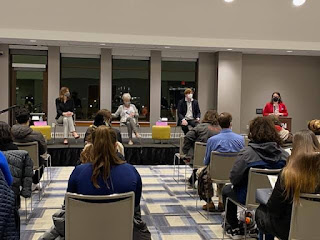Learn More
Human trafficking is composed of two primary forms of trafficking including sex trafficking and forced labor.
Sex trafficking covers commercial sexual exploitation of persons where the person is forced by another person to engage in such activities.
Escort services- forcing of persons to engage in sexual acts with paying parties without obtaining the profit for themselves
Pornography- forcing of persons to engage in sexual acts for commercial internet profit without obtaining the profit themselves
Child sex trafficking- commercially facilitated child sexual abuse
Child sex tourism- vacationing to specific areas that are more likely to obtain options to engage in the commercial sexual exploitation of youth
Forced labor is the physical exploitation of persons by employment against their will backed by threats and violence.
This form is frequent but not limited to labor services in massage, health, and beauty parlors, traveling sales crews, restaurants and food services, agriculture, construction, factories and manufacturing, carnivals, and hotels and hospitality services.
Child labor- socially, morally, physically harmful to children by forced work
Child soldiers- recruitment of children for military operations and campaigns
Debt bondage- forcing of persons to work for long periods of time in order to repay debt or other obligations
Legal Definition
So what exactly is human trafficking? There are many legal definitions for human trafficking from many different government organizations across the world but they all agree that “force, fraud, and coercion” is used in the exploitation of another person.
The Trafficking Victims Protection Act of 2000 defines sex trafficking as:
the recruitment, harboring, transportation, provision, obtaining, patronizing, or soliciting of a person for the purpose of a commercial sex act in which a commercial sex act is induced by force, fraud, or coercion, or in which the person induced to perform such act has not attained 18 years of age. (22 U.S.C. § 7102(11)(A)),
Forced labor is defined as:
the recruitment, harboring, transportation, provision, or obtaining of a person for labor or services, through the use of force, fraud, or coercion for the purpose of subjection to involuntary servitude, peonage, debt bondage, or slavery. (22 U.S.C. § 7102(11)(B)).
Statistics in Illinois from the National Human Trafficking Hotline
In Illinois, since 2007 the Human Trafficking hotline has received 6,213 calls, 616 online reports, 112 web chats, 740 SMS reports, and 137 email reports that have been reported. Of those numbers, 2,237 cases of human trafficking have been found, and 4,817 victims have been identified of those cases. In 2021 alone, 929 reports have been issued to the Human Trafficking Hotline, and 336 of those were from victims or survivors of human trafficking.
Signs of Trafficking According to the Human Trafficking Hotline signs someone may be experiencing sex trafficking are:
They want to stop participating in commercial sex but feel scared or unable to leave the situation.
They disclose that they were reluctant to engage in commercial sex but that someone pressured them into it.
They live where they work or are transported by guards between home and workplace.
They are children who live with or are dependent on a family member with a substance use problem or who is abusive.
They have a “pimp” or “manager” in the commercial sex industry.
They work in an industry where it may be common to be pressured into performing sex acts for money, such as a strip club, illicit cantina, go-go bar, or illicit massage business.
They have a controlling parent, guardian, romantic partner, or “sponsor” who will not allow them to meet or speak with anyone alone or who monitors their movements, spending, or communications.
According to the Human Trafficking Hotline signs someone may be experiencing labor trafficking are:
They are pressured to stay in a job or situation they want to leave.
They owe money to an employer or are not being what they were promised or are owed.
They don’t have control of their passport or other identity documents.
They live and work in isolated conditions.
They appeared to be monitored when talking or interacting with others.
Their employer threatens them with deportation or harm.
They work in unsafe working conditions with little to no regulations.
Living in overcrowded, dangerous, or inhumane conditions provided by their employer.
Resources Available to victims: National Human Trafficking Hotline:
Phone: 1-888-373-7888
Text: 233733
Chat Online
Anonymous Online Reporting
Center For Prevention of Abuse Phone: (309)691-0551 https://www.centerforpreventionofabuse.org/
If you believe you are a victim of human trafficking or may have information about a potential trafficking situation, contact the U.S. National Human Trafficking Hotline or Center for Prevention of Abuse line. If there is immediate danger, call 911.



Comments
Post a Comment